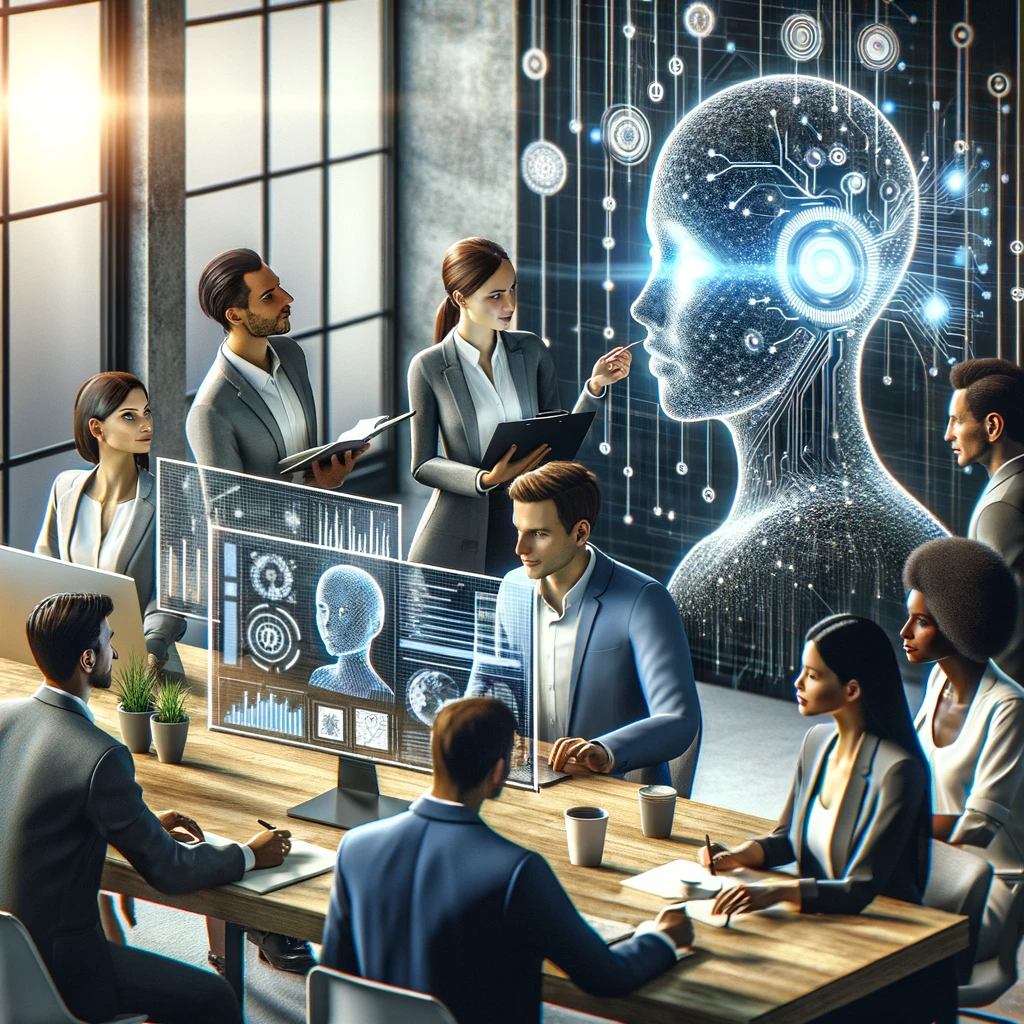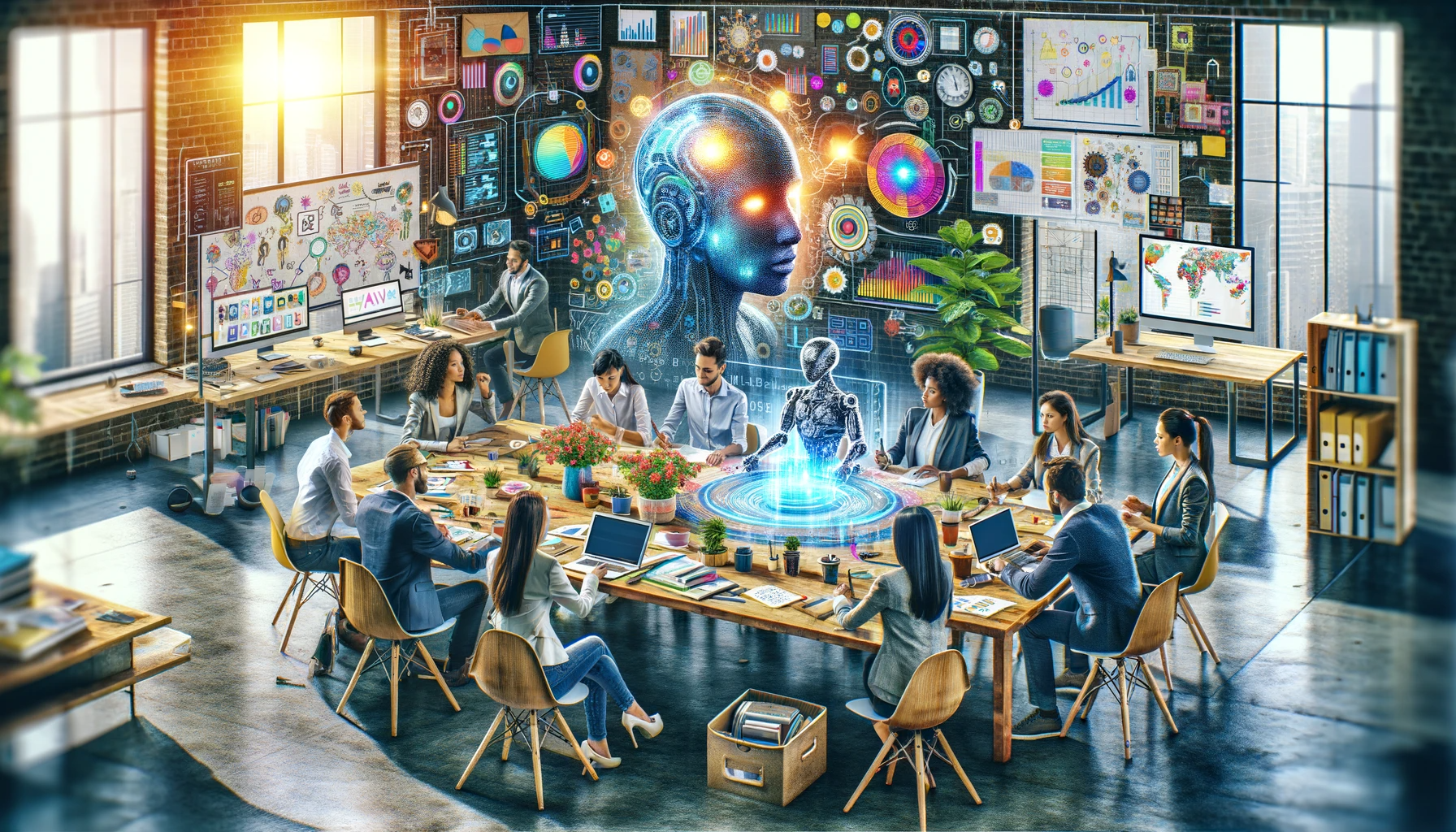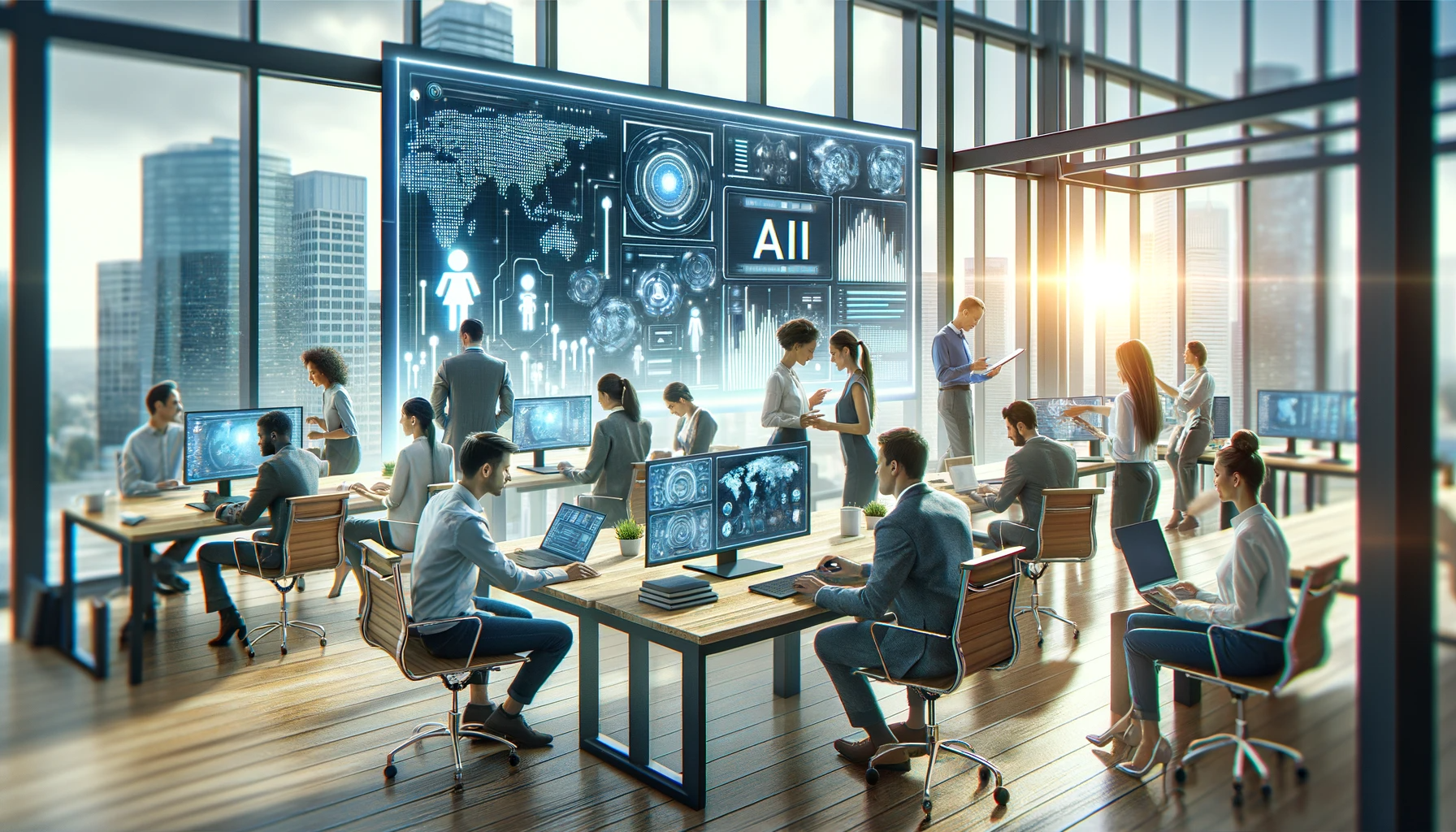The skills that brought professional success over the past century are insufficient for the age of Artificial Intelligence.
Industrial-era employees were rewarded for rote expertise, linear thinking, and stability...
But as technology reshapes industries overnight, a new breed of agile, future-ready mindsets is required for organizations to truly excel.

AI Is Changing the Game: Are You Ready to Play?
The advent of AI signifies a profound shift in our workplace culture.
It demands a departure from traditional approaches, urging business leaders and their organizations to adopt a mindset that views AI as a collaborative partner in their careers.
Using AI for support in the workplace requires an understanding of its capabilities and limitations. It requires fostering a symbiotic relationship where human creativity and AI efficiency merge - enhancing our own unique talent.
This paradigm shift is not just about adopting new tools; it's about reorienting our perspective towards work – where AI is an ally in navigating complex challenges and unlocking new opportunities.
It's Learn or Get Left Behind
In the AI era, the most sought-after skills and talent extend beyond technical proficiency.
A person with emotional intelligence, who is capable of creative problem-solving, and has the ability to synthesize information, is in high demand in today's world.
Today's employees must be adept at interpreting AI-generated data, deriving insights that drive strategic decisions.
It allows professionals of an organization to leverage these skills and insights to innovate and become leaders in their respective careers.
To remain competitive and effective in the AI-driven workplace, continuous education and training in enhancing these skills is vital, not only for yourself but also for all other leaders within the organization.
With AI on the Rise, Flexibility Isn't Just Nice, It's Necessary for Future-Proofing
Adaptability in the age of AI is more than just a skill...
It's a survival trait for our future of work - One that requires the energy to pivot and embrace change.
In a landscape where roles, industries, and technologies evolve rapidly, the ability to pivot and embrace change is paramount.
This means…
- Organizations must research to stay informed about emerging technologies
- Companies being open to new ways of working in the future
- And continuous training of employers and employees skill set
Adaptability is about foreseeing and navigating change.
It’s about embracing the unknown, and thriving in ambiguity.
Three Must-Do Key Actions to Stay Afloat in the AI Tide
- Get AI Experience: Diving into AI shouldn't be daunting but rather an exploration driven by curiosity. Start small by integrating AI tools in daily tasks, understanding their functionality, and gradually expanding their use to more complex projects. This hands-on experience demystifies AI, allowing one to appreciate its nuances and potential applications. Developing these practical AI skills is fundamental to thriving in the future of work.
- Track Emerging Trends: Staying on top of AI advancements for the future through continuous education isn't just beneficial; it's essential for organizations. This involves regular research on industry news, participating in forums, and networking with peers to exchange insights. It's about building a personal knowledge base that informs decision-making and strategy within our businesses.
- Reinvent Workflows: Rethinking our organizations workflows with AI at the core is crucial. This means not just incorporating AI into existing processes, but reimagining these processes from the ground up. It’s about questioning long-held assumptions, experimenting with new methodologies, and finding more efficient ways to achieve goals.
In the AI Storm, Resilience Is Your Anchor
Resilience in the AI era is about more than bouncing back from setbacks; it's about using these challenges as stepping stones for growth.
Employers and employees must cultivate a mindset that views failure as a learning opportunity – a chance to refine strategies and approaches.
Building resilience is about developing an inner strength that helps companies navigate the uncertainties of a rapidly changing professional landscape.
And to maintain a positive outlook even in the face of adversity.

Understanding AI: More Than Just Algorithms and Apps
To fully leverage AI, companies must understand its broader ecosystem.
Education in the latest tools and technologies, including understanding the principles of machine learning and AI algorithms, is crucial.
Leaders must recognize the societal and ethical implications of AI.
They must see AI not just as a series of tools, but as a complex system that intersects with various aspects of business and society.
AI Ethics: Steering Technology Towards Good
As AI becomes increasingly integrated into the fabric of business life, its ethical use becomes paramount.
This involves ensuring that AI systems are transparent, accountable, and free from biases.
Companies must be vigilant about the ethical implications of AI, advocating for responsible use that prioritizes the well-being of individuals and society.
AI at Work: Transforming the Mundane Into Magic
There is immense potential for AI's to support daily jobs.
From automating mundane tasks to providing sophisticated analysis, AI tools can significantly enhance productivity and efficiency, for both an employee and their employer.
The key is to research and identify areas where AI can add the most value – whether it's through time management, data analysis, or creative brainstorming, and then integrate these tools seamlessly into your workflow.
It's Not Human vs. AI – It's Human + AI
The future of work in our businesses is not about humans versus AI; it's about how humans and AI can collaboratively achieve more.
This partnership is about leveraging AI’s computational power with the nature of human creativity and empathy.
It’s a balance that requires a deep understanding of both the strengths and limitations of AI, and the insight to know when to rely on human judgment versus AI recommendations.
This synergy opens up avenues for creating new jobs that harness both human and AI strengths.
In the Age of AI, Creativity Still Reigns Supreme
In a world increasingly driven by algorithms and data, creativity remains uniquely a human talent.
AI can process and analyze data, but it cannot replicate the human capacity for original thought, empathy, and moral judgment.
Fostering creativity in the AI era means finding ways to integrate technology without stifling human ingenuity, encouraging a culture where innovative ideas from each employee are valued and nurtured.

Staying Ahead of the Curve
Continuous education and research in AI and improving our soft skills like critical thinking, communication, and leadership are essential to keep up with fast technological changes and empower existing employees.
It's about being proactive in our professional development – seeking out opportunities for growth, and staying curious and open-minded over the course of our careers.
Adapting To Change In The AI Era Requires A Blend Of Confidence And Humility
It means having the confidence to take risks and embrace new challenges, while also having the humility to acknowledge what one doesn't know and the willingness to learn.
This mindset enables employees to approach change with a sense of purpose and excitement, rather than fear.
The New Team Player Revolutionizing Collaboration
AI has the potential to revolutionize collaboration, breaking down barriers and fostering a more inclusive and effective working environment.
By automating routine tasks, AI frees up time for more meaningful, collaborative work for employees.
It provides insights and data that enhance decision-making and problem-solving, bringing together diverse business perspectives, expertise, and talent.
This is the future of work - an AI-driven collaborative job environment that is continuously creating new employment opportunities, diversifying and enriching the professional landscape.

Work Smarter, Live Better: AI's Promise for Work-Life Balance
AI tools offer the promise of greater work-life balance, automating routine tasks and providing more flexibility in how and when work is done.
However, achieving this balance requires a conscious effort to set boundaries and prioritize well-being.
It's about using AI to work smarter, not just harder, and ensuring that technology serves our needs, rather than the other way around.
When AI Throws a Curveball, Agility Hits It Out of the Park
In an AI-driven world, agility is about being prepared to adapt to new developments and unexpected challenges.
This means both employees and employers are open to new ideas and trends, willing to experiment, and quick to learn from both successes and failures.
It's about being flexible and responsive.
It’s about being able to pivot as circumstances change.
Leading with Heart in an AI-Driven World
Effective leadership in the age of AI involves guiding teams with a clear vision and a strong ethical framework.
It means leaders using AI to enhance their teams capabilities, talent and foster a culture of innovation and inclusivity.
Organization leaders and hiring managers must ensure that AI is used to support, not supplant, human talent, and that it is deployed responsibly and ethically.

Riding the AI Wave with Adaptability and Resilience: Will You Sink or Swim?
In an era where artificial intelligence (AI) is manufacturing the professional landscape, having the capability to adapt and be resilient is more crucial than ever.
To thrive in this AI-driven world, individuals and organizations must embrace change, harnessing the power of AI while maintaining their unique human talent and strengths.
Here are steps you can take to cultivate resilience and adaptability to thrive in the future of work:
- Start viewing AI as a key part of your job and explore its use in your field.
- Improve vital skills like emotional intelligence and problem-solving through courses.
- Stay adaptable by updating your skills and applying new approaches to your work.
- Dedicate time to focus on learning about AI's latest trends and impacts on your industry.
- See challenges as chances to grow and learn from them.
- Read up on AI's societal effects and ethical use.
- Join discussions on AI ethics to prepare and promote responsible use.
- Automate a daily task with AI for better productivity.
- Combine AI efficiency with your creativity and empathy in a project, showcasing your unique talent.
- Foster creativity by thinking of new solutions without immediately turning to AI.
- Keep learning through newsletters or podcasts in your field.
- Use recent changes as opportunities to innovate, applying your talent creatively.
- Improve team collaboration by integrating AI tools.
- Prioritize well-being with tech-free time in your routine.
- Stay open and quick to adapt by taking on new challenges and trends.
- Lead with a strong, ethical approach to AI in your team's work.
In Times Of Historic Change, Clinging To The Past Guarantees Irrelevance.
Cultivating adaptability and resilience ensures you stay relevant, no matter how radically industries evolve.
In order to meet the growing demand and be successful, we must embrace the possibilities of AI with an open mind and a commitment to continuous growth and learning, making it one of our top priorities for innovation.
The professionals who succeed in this future AI era will be those who can navigate change with agility, lead with integrity, and thrive by balancing the power of technology with the unique strengths of human creativity and empathy.
This positions them to benefit from job opportunities in the changing workforce.


